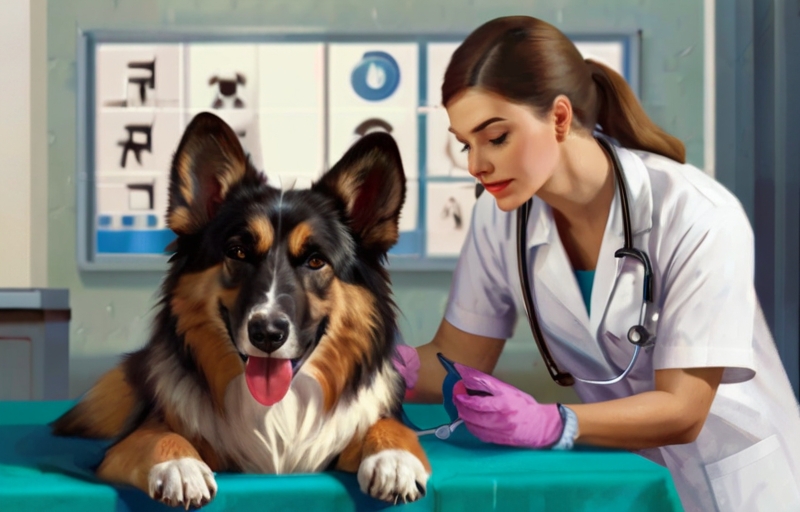Discover how to manage your dog’s upset stomach with our comprehensive guide. Learn to recognize signs, immediate steps to take, when to seek vet attention, and preventive measures for a happy, healthy pup.
Introduction:
Dogs, like humans, can experience stomach upsets that may manifest through symptoms such as vomiting, diarrhea, and discomfort. Pet owners need to understand the potential causes and take appropriate steps to alleviate their furry friend’s distress. In this comprehensive guide, we’ll explore common reasons for canine stomach upsets and provide practical advice on what to do if your dog is experiencing digestive issues.
How to Manage Your Dog’s Upset Stomach
Recognizing the Signs of Upset Stomach :
Before delving into remedies, it’s crucial to recognize the signs of a stomach upset in your dog. Common symptoms include vomiting, diarrhea, lethargy, loss of appetite, abdominal discomfort, and excessive drooling. Identifying these signs early allows for prompt intervention, preventing further complications.
Potential Causes of Canine Upset Stomach :

Understanding the potential triggers of stomach upsets in dogs is essential for effective management. Common causes include:
Dietary indiscretion:
Dogs are notorious for scavenging, and consuming inappropriate or spoiled food can lead to stomach upsets.
Sudden dietary changes:
Abrupt changes in your dog’s diet can disrupt their digestive system, leading to gastrointestinal distress.
Infections:
Bacterial, viral, or parasitic infections can cause stomach upsets. Common culprits include Salmonella, E. coli, and giardia.
Allergies or intolerances:
Dogs can be sensitive to certain ingredients in their food, leading to allergic reactions or intolerances.
Foreign body ingestion:
Swallowing non-food items, such as toys or bones, can cause stomach irritation and blockages.
Stress or anxiety:
Emotional factors, such as stress or anxiety, can contribute to digestive issues in dogs.
Immediate Steps to Take:

If you suspect your dog has a stomach upset, there are immediate steps you can take to provide relief:
Withhold food:
Temporarily withhold food for 12-24 hours to allow the digestive system to rest. Ensure access to fresh water to prevent dehydration.
Monitor for dehydration:
Keep an eye on your dog’s hydration status. If dehydration is suspected (signs include dry gums, lethargy, and sunken eyes), consult your veterinarian promptly.
Gradual reintroduction of food:
After the fasting period, reintroduce a bland diet consisting of easily digestible foods such as boiled chicken and rice in small, frequent meals.
Limit treats and table scraps:
Avoid giving your dog treats or table scraps during the recovery period, as these may exacerbate the stomach upset.
When to Seek Veterinary Attention:

While most cases of stomach upset resolve with home care, certain situations warrant immediate veterinary attention:
Persistent vomiting or diarrhea: If vomiting or diarrhea continues for more than 24 hours or is severe, consult your veterinarian.
Blood in vomit or stool: The presence of blood in vomit or stool is a concerning sign that requires prompt veterinary evaluation.
Lethargy or weakness: If your dog is lethargic, weak, or unresponsive, seek veterinary attention immediately.
Abdominal pain: Signs of abdominal pain, such as whining, hunching, or reluctance to be touched, should be addressed promptly.
Pre-existing health conditions: Dogs with pre-existing health conditions, such as diabetes or kidney disease, may require special attention. Consult your veterinarian for tailored advice.
Preventive Measures:
To minimize the risk of future stomach upsets, consider implementing the following preventive measures:
Maintain a consistent diet: Gradually transition your dog to a new diet and avoid sudden changes to prevent digestive upsets.
Avoid toxic substances: Ensure your dog doesn’t have access to toxic foods, plants, or substances that can cause gastrointestinal issues.
Provide a balanced diet: Feed your dog a well-balanced, nutritionally complete diet to support their overall health and digestive function.
Regular veterinary check-ups: Schedule regular veterinary check-ups to monitor your dog’s health and address any potential issues early on.
Stress management: Minimize stressors in your dog’s environment and provide a comfortable, secure space for them.
Conclusion:
A dog experiencing an upset stomach can be a cause for concern, but with prompt and appropriate care, most cases can be managed effectively at home. Additionally, implementing preventive measures can contribute to your dog’s overall well-being and reduce the likelihood of future digestive issues.
Read Also: Upset Stomach in Dogs
FAQs
Q: What are the common signs of stomach upset in dogs?
Common signs include vomiting, diarrhea, lethargy, loss of appetite, abdominal discomfort, and excessive drooling.
Q: Can I give my dog over-the-counter medications for stomach upset?
It’s crucial to consult your veterinarian before giving any medications. They can advise on suitable treatments based on your dog’s specific condition.
Q: How long should I withhold food if my dog has a stomach upset?
Temporarily withhold food for 12-24 hours to allow the digestive system to rest. Ensure access to fresh water during this period.
Q: What is a bland diet for dogs, and when should I introduce it?
A bland diet, like boiled chicken and rice, can be introduced after a 12-24 hour fasting period. It helps soothe the digestive system during recovery.
